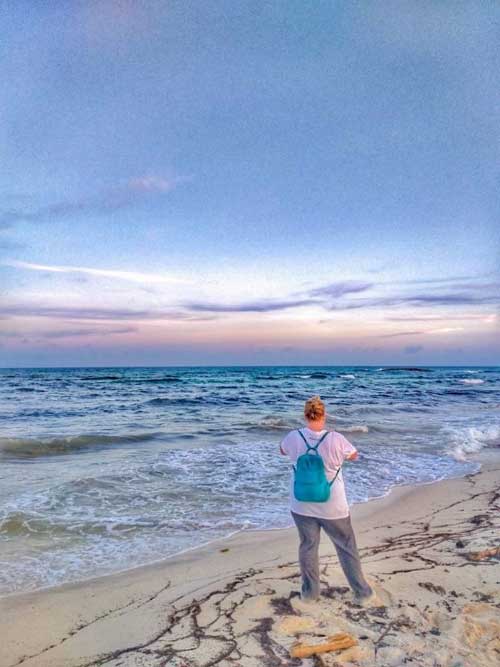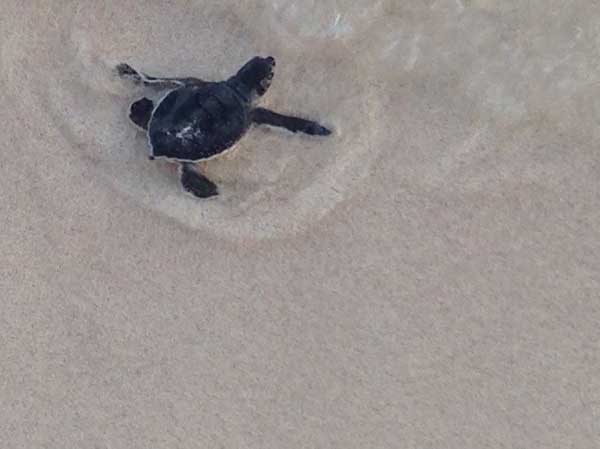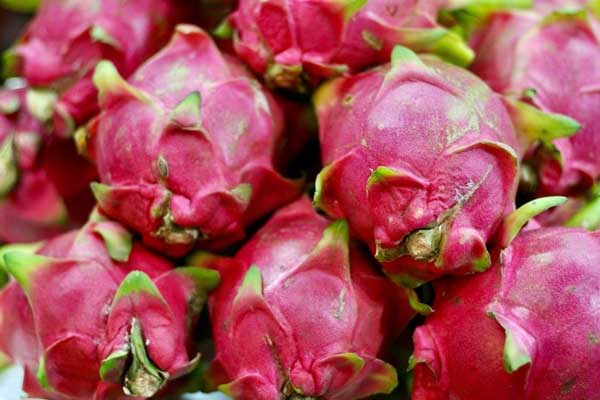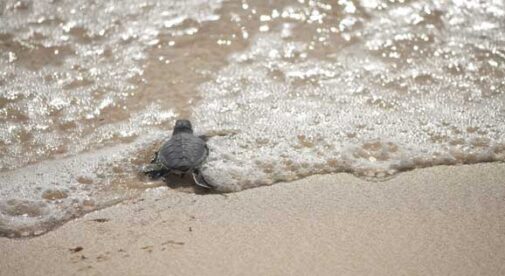“I am a shorts and flip-flops girl through and through,” Laurie Carter admits laughing. Which is why she and her partner Greg Rankin love living in the Mexican Caribbean. Before, while living in Seattle with weeks of drab grey days in winter, her heart longed to return to the sunshine and warm turquoise waters of Cozumel, Mexico’s largest island.
Dreaming of living in Mexico full time, when Laurie met Greg she wasn’t sure if he’d feel the same way. Then smiling she shared “he owned at least 15 pairs of swim trunks. It seemed a bit odd, but that turned out to be quite telling about how he would do in sunny Mexico.”
Are you interested in retiring abroad? Yes | Not Sure Yet
Moving to Cozumel full-time in 2007, they agree it was the best decision they ever made. Check out their video below:
How Does Life in Cozumel Compare to the U.S.?
Laurie’s big giving heart has recovered and thrived in her new Caribbean life.
After a debilitating divorce where she lost everything and sank into a depression, Laurie had all but given up her charitable works. Previously having volunteered at Seattle’s Cooperative Extension, Boys and Girls club, food banks, and community gardens they all fell by the wayside.
But Cozumel’s community embraced her. Healing and helpful, her passion for helping others reawakened and she shared “both Greg and I have found ourselves leaning into the community. Establishing connections, identifying needs, finding and coordinating solutions has become our specialty.”
Once again volunteering brings her joy, helping not only her fellow mankind but also the animals of Cozumel.
Cozumel’s Wildlife Conservation Project
Being heavily involved in the Humane Society helping save, rescue, and foster street cats and dogs is very rewarding. But getting involved with the island’s wildlife conservation project to help with endangered sea turtle nesting sites has enriched her life.
The sea turtle program run by Cozumel Parks at Punta Sur—the island’s largest eco-park—is only available to a few Cozumel residents. With intensive training and adhering to strict rules in place by the resident marine biologist, they venture into Cozumel’s largest eco-park at night to help rescue and save the baby sea turtles.
During turtle breeding season, it’s almost a nightly labor of love starting with a beach clean-up as the sun goes down.

Nesting female turtles come ashore and under a red light are observed. A red light is used so it doesn’t disturb the turtle’s natural day/night cycle. They stand back and let her lay her eggs, counting them and then marking where the nest is so it will not be disturbed.
Once all details are recorded, a hatch date is worked out so that they can keep an eye out for the hatching babies. When the hatchlings leave the nest, it is very carefully dug out gently by hand to help any struggling baby turtles and again an egg count is done to check the viability and breeding health of wild turtle populations.
At night, again under red light so as not to disturb the baby sea turtles who need to look to the horizon’s moonlight to find the water, they are released and begin their journey to the ocean.

This is vital to their memory so that in about twenty years females can find their way back to that very same beach to lay their own eggs. The trek to the ocean ingrains itself into their memory each time their little flippers propel them along the sand.
“Being a part of this program enriches my life,” Laurie says. Meeting locals while doing other charitable works on the island is what led to Laurie being one of the few accepted into the program. This is why Laurie states that it’s important to meet your neighbors and integrate into your new community.

Get Your Free Mexico Report Here:
Learn more about Mexico and other countries in our daily postcard e-letter. Simply enter your email address below and we'll send you a free special report - Why Millions of Americans Are Moving to Mexico.
This special guide covers real estate, retirement and more in Mexico and is yours free when you sign up for our postcards below.
How Do You Find Living on Cozumel?
Cozumel’s community has welcomed and embraced Laurie and Greg. She found herself leaning into the warmth of the people loving the sense of neighbor looking after neighbor. As she says “Here on Cozumel, people look after each other they don’t expect the government to. Their neighbors, community, and churches provide for those in need.”
But it’s more than that. It’s the old saying sharing is caring that we learned in kindergarten. People share food, help raise money for hospital needs and care for those in a tight spot financially. Even though the cost of living is a lot cheaper, if someone loses a job and is struggling others help by donating what little they have and help provide food and finding other job opportunities.
And all of the neighbors are the same …
Laurie laughs out loud while telling me “my favorite time of day is when I wake up and my neighbor’s cheeky parrot Currro is staring at me through the window. He scolds me until I get up and make my coffee to talk and whistle to him while we enjoy breakfast together.”
Now that’s the perfect breakfast buddy and way to start the day for any nature lover. And the perfect way Laurie and Greg love to end their day is by taking their little dog Chappie for a walk along the malecón watching the sunset over the Caribbean. It’s the simple pleasures like this that bring them the most happiness.
Or walking the few blocks down to the ocean to swim with swaying sea fans and snorkel with colorful tropical fish. It’s this free and easy laidback island life that they love. Plus, it’s free to enjoy the great weather year-round walking your dog in the twilight when things cool down a bit. Then perhaps stopping somewhere for dinner because it’s so cheap to eat out at one of the many restaurants within walking distance of their house.
Not that they eat out that often. They prefer to enjoy a walk after dinner and avoid the hustle and bustle of restaurant-lined streets downtown.
Your Complete Guide to Cozumel, Mexico: Things To Do and Cost of Living
How Do You Find the Cost of Living in Cozumel?
On a budget of around $1,000 a month, Laurie says they still live well on Cozumel. Even though it’s considered the largest cruise line port in Mexico and the Caribbean, you would expect things to be more expensive.
But as Laurie says “we’re happy in the cheap seats”. All of the things they like doing are generally free so they don’t actually need a lot to live on. Plus, the price of groceries is a lot cheaper with marvelous variety. Tropical fruits like dragon fruit are something they just didn’t get or were insanely expensive in Seattle. Whereas now Laurie enjoys them for breakfast regularly. Along with Curro happily chirping by her side of course.

She confesses “sometimes all of the fresh fruit and vegetables look so good in the supermarket that I stop and take pictures! There is such an amazing variety of fruits, vegetables, and fresh herbs and for a third to a quarter of the price.”
Of course, if you buy imported foods then you pay higher prices. Chuckling Laurie said, “We won’t pay a fortune for a peach when we can get a pineapple for half the price”. Being adaptable and buying what is abundant all the time or in season means much more food for a much smaller grocery bill.
“It’s easy to live well here on a budget” Laurie states but clarified that “we don’t have and don’t want air conditioning. A large fan is enough which means our electricity bill is only usually between $350 to $500 pesos every two months”. That’s $17 to $25 dollars U.S.
With a rent of only $400 a month and by choosing to embrace the warm Caribbean weather and commute by motorcycle like so many others on the island Laurie says you can have a good life on a budget. Plus, renting “has also allowed us to fine-tune (and change) our preferences regarding location, value, security, features, and amenities.” Which is a wise way of finding great deals in safe neighborhoods.
But safety is something she’s never had an issue with. None of her neighbors speak English but all are lovely and welcoming sharing things and always smiling and waving. It’s the Mexican warmth that helped her so much after moving to Cozumel.
That and her time in nature.
Do What You Love
By connecting with other like-minded people Laurie slipped into her new life easily. By volunteering at the Humane Society, she was introduced to a wide circle of local people passionate about animal welfare, and other expats. Kindred spirits, she’d found her tribe. It was an instant family, acceptance, and the start of wonderful friendships that have lasted years.
If you do what you love when you move abroad you’ll find your friends. A photography club, a knitting circle, or an art class. No matter what you love or want to learn, it is an excellent way to find new friends quickly.
So lastly, I asked if Laurie had any advice for anyone else who dreams of moving abroad to live a Caribbean life.
Words of Advice
The number one thing she says is “an attitude that is flexible, humble, patient, and caring is the most important thing you can bring with you to a foreign country.”
Things will be different. You may not be able to find your favorite brand of peanut butter but there is bound to be something just as good if you ask. Or try something new. That is where flexibility has enriched Laurie’s life.
She’d never really eaten dragon fruit before, but now she loves it and her eyes light up when the big piles of fresh dragon fruit appear in the supermarket.
It’s also a good way to explore. Telling me stories of laughing during beach clean-ups in the remote corners of the island, she sees pristine places rarely touched by others.
Her last piece of advice is this “a dream can become a reality. I am living proof that a person can lose nearly everything, yet still, hang on to and live their dreams.”

Get Your Free Mexico Report Here:
Learn more about Mexico and other countries in our daily postcard e-letter. Simply enter your email address below and we'll send you a free special report - Why Millions of Americans Are Moving to Mexico.
This special guide covers real estate, retirement and more in Mexico and is yours free when you sign up for our postcards below.
Related Articles
The Best Places to Live in Mexico as a U.S. Expat
5 Best Caribbean Islands to Live On… and 2 to Avoid
Upcoming Conferences
The Only 2024 Fast Track Panama Conference
If your dream retirement involves stunning beaches… lush green mountains… a warm climate with no hurricanes… first-rate healthcare… incredible value for money (a couple can live well on $2,200 a month)… and the World’s #1 Retiree Discount Program…
Join our Panama experts and expats in February and discover why Panama could be your perfect paradise.
REGISTER NOW, SEATS LIMITED: EARLY BIRD DISCOUNT HERE


.png)